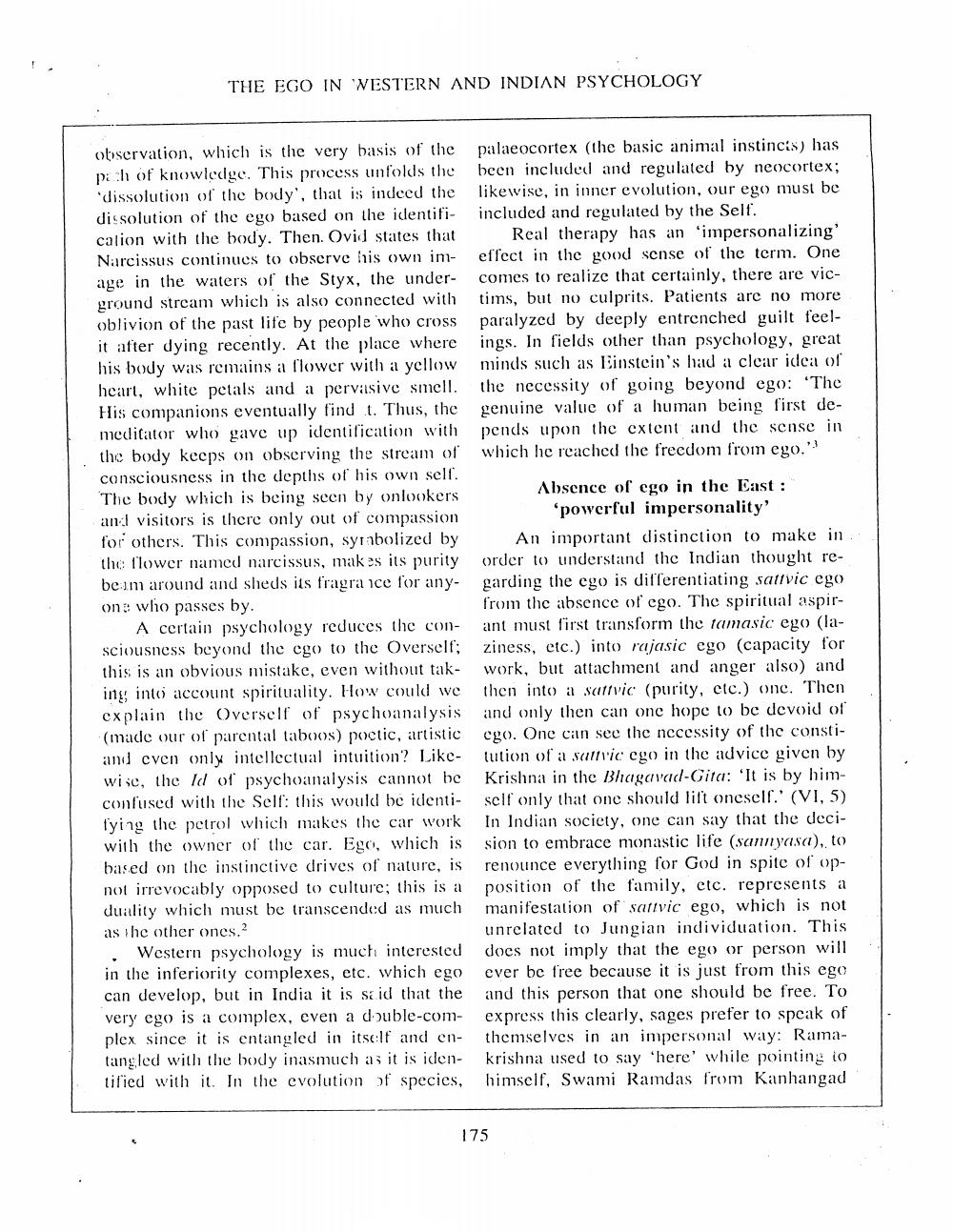________________
THE EGO IN WESTERN AND INDIAN PSYCHOLOGY
observation, which is the very basis of the palaeocortex (the basic animal instincts) has path of knowledge. This process unfolds the been included and regulated by neocortex; dissolution of the body', that is indeed the likewise, in inner evolution, our ego must be dissolution of the ego based on the identifi- included and regulated by the Self. calion with the body. Then. Ovid states that Real therapy has an 'impersonalizing' Narcissus continues to observe his own im- effect in the good sense of the term. One age in the waters of the Styx, the under- comes to realize that certainly, there are vicground stream which is also connected with tims, but no culprits. Patients are no more oblivion of the past life by people who cross paralyzed by deeply entrenched guilt feelit after dying recently. At the place where ings. In fields other than psychology, great his body was remains a flower with a yellow minds such as Einstein's had a clear idea of heart, white petals and a pervasive smell the necessity of going beyond ego: 'The His companions eventually find t. Thus, the genuine value of a human being first demeditator who gave up identification with pends upon the extent and the sense in the body keeps on observing the stream of which he reached the freedom from ego.'' consciousness in the depths of his own self. The body which is being seen by onlookers
Absence of ego in the East : and visitors is there only out of compassion
powerful impersonality' for others. This compassion, syrabolized by An important distinction to make in the flower named narcissus, makes its purity order to understand the Indian thought rebeim around and sheds its fragra ice for any- garding the ego is differentiating sattvic ego one who passes by.
from the absence of ego. The spiritual aspirA certain psychology reduces the con- ant must first transform the tamasic ego (lasciousness beyond the cgo to the Overself; ziness, etc.) into rajasic ego (capacity for this is an obvious mistake, even without tak- work, but attachment and anger also) and ing into account spirituality. How could we then into a salvic (purity, etc.) onc. Then explain the Overself of psychoanalysis and only then can one hope to be devoid of (made our of parental taboos) poctic, artistic cgo. One can see the necessity of the constiand cven only intellectual intuition? Like- tution of a salvic ego in the advice given by wise, the Id of psychoanalysis cannot be Krishna in the Bhagavad-Gita: 'It is by himconfused with the Self: this would be identi- self only that one should lift oneself.' (VI, 5) fying the petrol which makes the car work In Indian society, one can say that the deciwith the owner of the car. Ego, which is sion to embrace monastic life (sannyasa), to based on the instinctive drives of nature, is renounce everything for God in spite of opnot irrevocably opposed to culture; this is a position of the family, etc. represents a duality which must be transcended as much manifestation of sativic ego, which is not as the other ones.
unrelated to Jungian individuation. This • Western psychology is much interested does not imply that the ego or person will in the inferiority complexes, etc. which ego ever be free because it is just from this ego can develop, but in India it is said that the and this person that one should be free. To very ego is a complex, even a double-com- express this clearly, sages prefer to speak of plex since it is entangled in itself and on themselves in an impersonal way: Ramatangled with the body inasmuch as it is iden- krishna used to say 'here' while pointing to tified with it. In the evolution of species, himself, Swami Ramdas from Kanhangad
175




